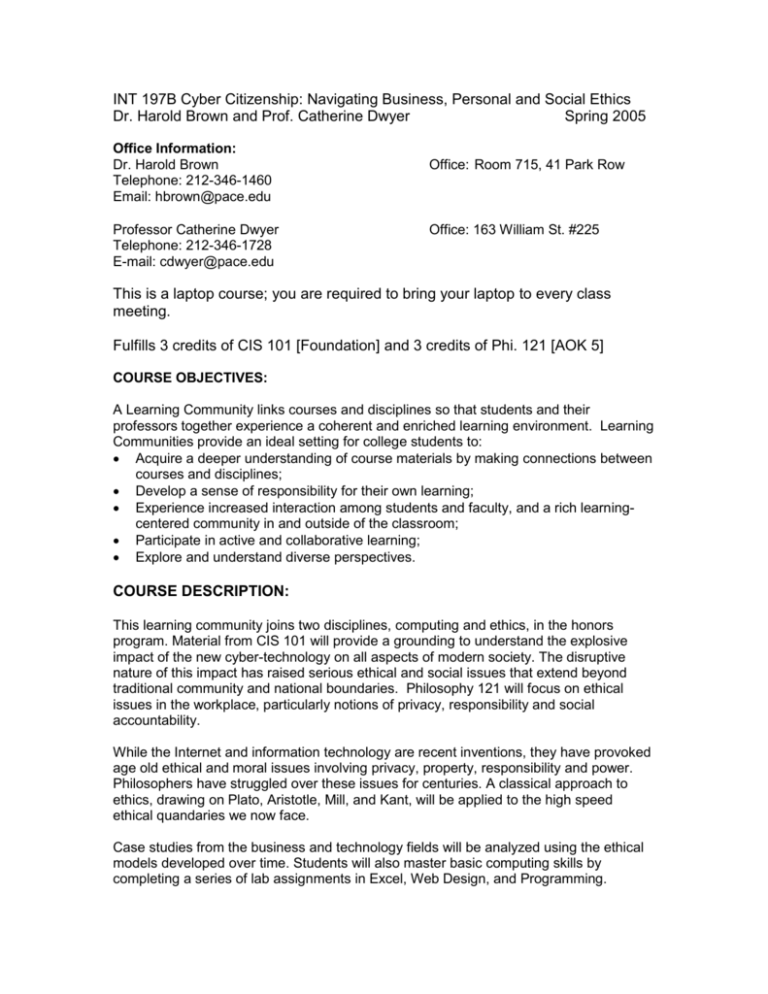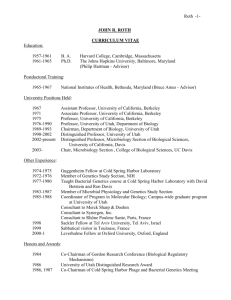
INT 197B Cyber Citizenship: Navigating Business, Personal and Social Ethics
Dr. Harold Brown and Prof. Catherine Dwyer
Spring 2005
Office Information:
Dr. Harold Brown
Telephone: 212-346-1460
Email: hbrown@pace.edu
Professor Catherine Dwyer
Telephone: 212-346-1728
E-mail: cdwyer@pace.edu
Office: Room 715, 41 Park Row
Office: 163 William St. #225
This is a laptop course; you are required to bring your laptop to every class
meeting.
Fulfills 3 credits of CIS 101 [Foundation] and 3 credits of Phi. 121 [AOK 5]
COURSE OBJECTIVES:
A Learning Community links courses and disciplines so that students and their
professors together experience a coherent and enriched learning environment. Learning
Communities provide an ideal setting for college students to:
Acquire a deeper understanding of course materials by making connections between
courses and disciplines;
Develop a sense of responsibility for their own learning;
Experience increased interaction among students and faculty, and a rich learningcentered community in and outside of the classroom;
Participate in active and collaborative learning;
Explore and understand diverse perspectives.
COURSE DESCRIPTION:
This learning community joins two disciplines, computing and ethics, in the honors
program. Material from CIS 101 will provide a grounding to understand the explosive
impact of the new cyber-technology on all aspects of modern society. The disruptive
nature of this impact has raised serious ethical and social issues that extend beyond
traditional community and national boundaries. Philosophy 121 will focus on ethical
issues in the workplace, particularly notions of privacy, responsibility and social
accountability.
While the Internet and information technology are recent inventions, they have provoked
age old ethical and moral issues involving privacy, property, responsibility and power.
Philosophers have struggled over these issues for centuries. A classical approach to
ethics, drawing on Plato, Aristotle, Mill, and Kant, will be applied to the high speed
ethical quandaries we now face.
Case studies from the business and technology fields will be analyzed using the ethical
models developed over time. Students will also master basic computing skills by
completing a series of lab assignments in Excel, Web Design, and Programming.
Course Goals of Cyber Citizenship: Navigating Business, Personal and
Social Ethics
At the end of this course, students will:
Have learned and analyzed standards for personal and professional
ethical behavior based on classical philosophical foundations
Be able to apply ethical standards to their own interaction with technology
and the potential use and misuse of technology in a social or professional
setting
Have a basic understanding of computer architecture in order to
understand the speed, power, and complexity that modern technology
brings to ethical issues
Have completed a series of hands-on computer labs, thereby obtaining
proficiency in the use of Excel, HTML, and JavaScript (a programming
language)
Be able to produce their own blogs and web sites
TEXTS:
Roth, William F. Ethics in the Workplace: A Systems Perspective. Pearson:
Prentice Hall, 2005. ISBN 0-13-184815-1
Plato, Protagoras, translated by C. C. W. Taylor. Oxford University Press.
ISBN 0-19-282330-2
CIS101 Text package, which includes the following:
Shelly, Cashman, Vermaat, Discovering Computers 2005, Concepts for a
Digital World, Brief edition, Course Technology
Shelly, Cashman, Quasney, Excel Introductory Concepts and Techniques,
Course Technology
Shelly, Cashman, Woods, Dorin, HTML Complete Concepts and
Techniques, 2nd ed., Course Technology
Dwyer, Murthy, Sachs, and Gaylord, JavaScript 101, Version 3.0,
Thomson Custom Publishing
READINGS and CLASS SCHEDULE:
#
1
2
Week Interdisciplinary
of
theme
Jan Ethics in a wired
24 world
Jan Are ethical
31 systems possible,
practical and
Lab Exercise
Readings
Excel 1
Roth, Chapter 1
Excel 2
DC 2005* Chapter 1
Roth, 2; Plato, Protagoras
DC 2005, 2
3
4
5
6
7
8
beneficial?
Feb 7 Social
consequences of
technological and
economic
decisions
Feb Information bias
14
Feb Who owns the
21 Internet? Who
should control it?
Feb How do ethical
28 systems evolve?
Mar 7 Traditions
backlash against
technology
Mar Role of
14 technology in
empowerment
Excel 3
Roth, 3; Protagoras
DC 2005, 3
Internet
research;
Introduction to
HTML
HTML 1
HTML 2
Midterm
HTML 3
Roth, 4; Aristotle,
Nicomachean Ethics
Evaluation of Internet
Resources
Roth, 5; Aristotle, NE.
DC 2005, 4
Roth 6; Kant, Fundamental
Principle of the Metaphysic
of Morals.
Computer Security
Midterm. Roth 7
Roth, 8; Kant, Fundamental
Principle; Selections from
Lectures on Ethics
[electronic reserve]
DC 2005, 5
9
10
Break
Mar Impact of
28 technology in the
workplace
JavaScript
Apr 4 Outsourcing – is it JavaScript
ethical?
Roth 9; Mill, Utilitarianism.
THE IMPACT OF
TECHOLOGY: Postman,
“The Judgment of Thamus;”
Thurow, “A New System of
Intellectual Property Rights.
[electronic reserve]
DC 2005, 6
Roth 10; CORPORATE
RESPONSIBILITY:
Friedman, “The Social
Responsibility of Business
is to Increase its Profits”;
Freeman, “A Stakeholder
Theory of the Modern
Corporation.”
11
12
13
Apr Technology and
11 training
Apr Where has the
18 systems
approach
worked?
Apr Ethical
25 expectations of
technology
JavaScript
JavaScript
Roth 11; PRIVACY: Alder,
“Ethical Issues in
Electronic Performance
Monitoring;” Cases:
“Testing for Honesty” and
“She Snoops to
Conquer.” [electronic
reserve]
DC 2005, 7
Roth 12: AFFIRMATIVE
ACTION: Beauchamp,
“Goals and Quotas in Hiring
and Promotion;” Arnold,
“Affirmative Action and the
Demands of Justice.”
[electronic reserve]
DC 2005, 8
Roth 13: Carr, “Is Business
Bluffing Ethical. ”
Carson, “ Second
Thoughts About Bluffing.”
Final
* Discovering Computers 2005
REQUIREMENTS & GRADING
Class attendance is mandatory – class participation counts as 20% of your final grade;
there will be two short papers = 20%; the midterm is 15% and the final [part take-home
and part in-class] will be weighted at 20%. There will also be a group final project (15 %)
that will create a web site. [Note: Part of class attendance and participation includes:
reading the assignment, posting to your blog, doing one presentation, and bringing
required texts to class.]
Description
Class attendance and participation
(includes online blogging and
presentation)
Lab Exercises
Paper 1
Paper 2
Team Final Project (web site)
midterm
Final Exam
Total
%
20
10
10
10
15
15
20
100
ONLINE CONTENT AND RESOURCES
The course web site is at http://csis.pace.edu/~dwyer/cyberethics. Courses resources
and links to online reading assignments can be found there.
Considerable use will be made of "blackboard” in this class. The address for blackboard
is http://blackboard.pace.edu.
Each student and instructor will keep a weekly journal in the form of a web blog, or log.
Weekly postings in response to reading material and assigned questions are required. In
addition, you will frequently be asked to respond and critique your classmate’s postings
(and therefore yours will be responded to as well).
PLAGIARISM:
Using the words and/or ideas of another person as though they were one’s own.
Minimum punishment for plagiarism is mandatory rewriting plus failure in the
assignment. For more, see the section on Plagiarism at the end of this syllabus.
CIVILITY:
Civility can be described as the complex set of behaviors because of which men and
women can live within a community composed primarily of strangers. Civility can take
both positive and negative forms; we will adopt one negative principle of civility from the
very beginning of the course: no behavior will be tolerated which infringes on the rights
of others to learn and to teach. The following are examples of behaviors that might
infringe on the rights of others:
In class use of cell phones and beepers;
Walking in and out of classroom while class is in session;
Conversing with classmates;
Eating;
Drinking;
Sleeping;
Passing messages;
Clipping nails;
Laughing at or otherwise ridiculing students who make mistakes at the blackboard
or, e.g., answering questions.
A positive rule of civility might be the following: whenever possible - except during
examinations - we should try to help others with their work in this course.
If you believe your right, e.g., to use your cell phone outweighs the rights of the rest of
the class to be free from the distraction of a ringing telephone, and that therefore it
should be permissible for you to have your phone “on” during class, discuss the matter
with me. During the course of the semester we will be discussing the concept of civility in
great detail.









